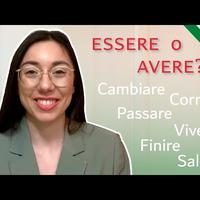Which auxiliary verb with these Italian verbs? Correre, vivere, salire, finire, cambiare, passare.
Ciao a tutti bentornati sul mio canale.
In questo video parliamo dei seguenti verbi:
Correre Vivere
Salire Finire
Cambiare Passare
Perché parliamo di questi verbi? Perché sono dei verbi che possono essere utilizzati
sia con l'ausiliare “essere” sia con l'ausiliare “avere”. Ovviamente, nei
tempi composti. Prenderemo ad esempio il passato prossimo in questo video.
Iniziamo subito.
Vediamo il verbo CORRERE.
(1) Ho corso tutto il giorno oggi (2) Sono corso/a per venire da te
Il primo esempio (1) può indicare un'attività fisica oppure può dare importante all'atto
di correre in sé, non alla destinazione finale. E infatti neanche la menziono nella frase,
non dico dove sono andata, dico che ho corso tutta la mattina.
Il secondo esempio (2) invece indica un movimento veloce per raggiungere un luogo o una persona,
quindi si dà importanza alla destinazione finale.
Vediamo ora il verbo VIVERE
(1) Ho vissuto (2) Sono vissuto/a
Con il verbo VIVERE non c'è differenza di significato, quindi la scelta dell'ausiliare
è semplicemente una preferenza del parlante, il parlante sceglie se utilizzare uno o l'altro.
Personalmente mi ritrovo ad usare “ho vissuto”, con l'ausiliare “avere”. Ma sei voi
dite “sono vissuto/a” va benissimo, però forse dovete stare attenti alle frasi.
Infatti “Ho vissuto” si predilige in frasi del tipo “Ho vissuto tre mesi qui”, “Ha
vissuto una vita intensa”, quindi in frasi che hanno il complemento oggetto.
Mentre si predilige il verbo “essere” come ausiliare nelle frasi senza complemento
oggetto. E quindi diremmo: “Sono vissuto/a qui per tre mesi”, “sono vissuto/a a Trieste”,
eccetera.
Vediamo ora il verbo SALIRE
(1) Ho salito (2) Sono salito/a
Utilizziamo “Ho salito” con un complemento oggetto, e quindi si specifica che cosa si
sale, quindi “ho salito le scale”.Questo è il classico esempio che si fa con questo
verbo, “ho salito le scale in fretta”. Al contrario “Sono salito/a a casa per salutare
nonna”, non c'è un complemento oggetto in questa frase. Semplicemente è un utilizzo
intransitivo del verbo “salire”. Do quindi per scontato che salgo delle scale. Quindi non menziono che ho salito delle scale. Vediamo ora il verbo FINIRE.
(1) Ho finito il libro. (2) Sono finito/a in una brutta situazione.
“Ho finito il libro” può voler dire che “Ho finito di leggere il libro” ma anche
che “ho finito di scrivere il libro”. In ogni caso “ho finito qualcosa”, quindi
io - agente attivo dell'azione - ho finito qualcosa - un oggetto. Quindi in questo caso
“finire” è un verbo transitivo.
Se invece dico: “Sono finito/a in una brutta situazione”, sto usando il verbo “finire”
come verbo intransitivo. E quindi devo usare il verbo “essere” come ausiliare, nella
frase infatti non c'è un complemento oggetto, “sono finita in una brutta situazione”,
che vuol dire che “mi ritrovo in una brutta situazione”.
È lo stesso discorso per quando diciamo “Il film è finito” oppure “il film è cominciato”,
in questo caso utilizziamo il verbo “finire” e il verbo “cominciare” nella loro funzione
di verbi intransitivi.
Vediamo il verbo CAMBIARE.
(1) Ho cambiato casa. Verbo transitivo. Ho cambiato, che cosa? Casa.
(2) Sono cambiato/a. Verbo intransitivo. Se dico “sono cambiata” significa che c'è
un cambiamento interiore oppure di comportamento della persona.
Vediamo l'ultimo verbo, PASSARE.
(1) Ho passato un bel fine settimana con voi.
In questo esempio uso “passare” come verbo transitivo. Un sinonimo in questa frase può
essere “trascorrere”, “ho trascorso un bel fine settimana con voi”.
Se invece dico:
(2) Sono passato/a per salutarti. Uso passare come verbo intransitivo, significa “sono
venuto/a qui per salutarti”.
La mia spiegazione si conclude qui per oggi, ma se avete domande, lasciatele nei commenti
qui sotto.
Quando usate questi verbi, fate sempre attenzione a quello che volete dire, perché possono
essere sia transitivi e intransitivi, e quindi si possono costruire frasi diverse a seconda
di quello che vogliamo esprimere.
Grazie per aver guardato questo video e ci vediamo nel prossimo. A presto, ciao!

